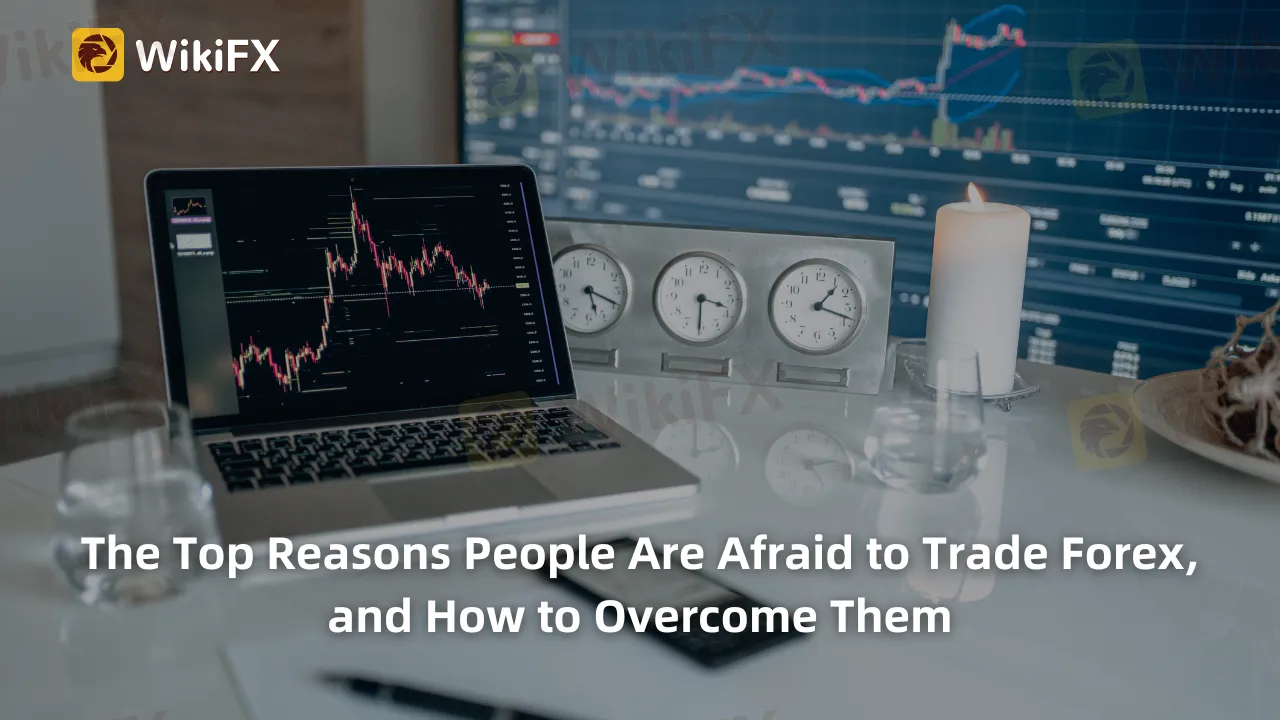简体中文
繁體中文
English
Pусский
日本語
ภาษาไทย
Tiếng Việt
Bahasa Indonesia
Español
हिन्दी
Filippiiniläinen
Français
Deutsch
Português
Türkçe
한국어
العربية
The Top Reasons People Are Afraid to Trade Forex, and How to Overcome Them
Abstract:Forex trading fears include losses, inexperience, scams, and emotional challenges. Overcome them through education, demo accounts, regulated brokers, realistic goals, and emotional intelligence to achieve trading success.

The FX market is the world's biggest and most liquid financial market, with daily transactions totaling billions of dollars. Forex trading has grown in popularity owing to its ease of use and the potential for large gains. However, due to various fears and misconceptions, many people are still hesitant to enter the world of forex trading. In this post, we'll look at the most prevalent causes of these worries and provide practical strategies to assist new traders overcome them.
Fear of Losing Money
The fear of losing money is one of the key reasons why individuals are hesitant to trade forex. Forex trading entails some risk, and it is reasonable for newcomers to be worried about possible losses.
Solution: Begin with a practice account to understand basic risk management. A demo account enables you to practice trading without risking real money, which aids in the development of expertise and confidence. Furthermore, learning and employing risk management techniques such as setting stop-loss orders and controlling position sizes can help you significantly reduce your risk exposure.
Lack of Knowledge and Experience
Many individuals shy away from forex trading because they feel they lack the requisite expertise and experience. The forex market might seem confusing and scary, especially to newcomers.
Solution: Invest in knowledge and practice. To become a good forex trader, you must first study the fundamentals of the market, which include fundamental and technical analysis, trading methods, and risk management. This information may be obtained via online courses, books, webinars, and blogs. Using a demo account to practice can also help you acquire experience and improve your trading abilities. WikiFX, on the other hand, provides forex traders with instructional tools covering fundamentals, tactics, risk management, and market analysis in order to develop educated, effective trading.
Fear of Scams and Fraud
Scammers and fraudsters abound in the currency market, leading to widespread distrust of the business. Many prospective traders are anxious about becoming victims of scams, especially in the uncontrolled Internet trading environment.

Solution: Select a licensed broker and double-check their credentials. To avoid fraud, it is essential to deal with a recognized and registered broker. Regulatory organizations such as the FCA, ASIC, and CySEC guarantee that brokers follow stringent criteria and offer a secure trading environment. Before opening an account, always check the broker's regulatory status. WikiFX also assists in the identification of fake brokers by offering broker evaluations, regulatory information, and user experiences in order to safeguard traders from fraudulent actions.
Overwhelming Amount of Information
For newcomers, the sheer number of information accessible regarding forex trading may be daunting and perplexing. This may cause individuals to get paralyzed, stopping them from taking the initial step into the world of forex trading.
Solution: Concentrate on the basics and divide the learning process into small chunks. Begin with understanding the fundamentals of forex trading, such as currency pairings, pips, leverage, and margin. Once you've mastered these concepts, you can progress to more advanced topics like technical and fundamental analysis. To avoid knowledge overload, divide your learning journey into tiny, manageable chunks.
Fear of Committing Time and Effort
Becoming a successful forex trader necessitates a significant time and effort investment. Many individuals are hesitant to devote the required resources for fear of not achieving the intended goals.
Solution: Create a trading strategy and set reasonable targets. Before you begin trading, it is critical to establish clear and attainable goals that take into account your financial situation, risk tolerance, and time commitment.
Creating a clear trading plan that includes your chosen trading strategy, risk management guidelines, and performance assessment criteria will assist you in remaining focused and dedicated to your objectives.
Emotional Challenges
Because it involves dealing with uncertainty, risk, and potential losses, forex trading can be emotionally taxing. Many individuals are concerned that they will be unable to deal with the emotional demands of trading.

Solution: Develop emotional intelligence and a solid trading attitude. It is critical for effective forex trading to learn to regulate your emotions, such as fear, greed, and frustration. Increasing your emotional intelligence will help you make more sensible judgments and prevent rash mistakes that might lead to losses. Mindfulness, meditation, and journaling are all techniques that may help you develop a strong trading attitude and better regulate your emotions.
Fear of Failure
Many ambitious forex traders struggle with the fear of failure. They are afraid of making errors and failing to meet their objectives, which keeps them from entering the world of forex trading.
Solution: Accept failure as a learning experience. It is important to recognize that errors and setbacks are a normal part of the learning process. Instead of being afraid of failure, look at it as a chance to learn, develop, and enhance your trading abilities. Analyze your trading results on a regular basis, discover areas for improvement, and be willing to change your trading strategy as required.
Misconceptions About Forex Trading
Some individuals believe that forex trading is a get-rich-quick scam or that it needs unusual knowledge or luck to succeed. These myths might deter prospective traders from joining the market.
Solution: Educate yourself and set reasonable goals. It is critical to debunk these myths by realizing that forex trading is not a quick way to money, and that success involves effort, discipline, and ongoing learning. Maintaining realistic expectations regarding prospective earnings and the time required to become a good trader can assist you in maintaining a healthy mentality and avoiding disappointment.
Conclusion
While it is understandable to have fears and concerns about forex trading, they can be overcome with the right approach and mindset. Aspiring traders may overcome their anxieties and thrive in the world of forex trading by investing in education, practicing with a demo account, selecting a licensed broker, establishing realistic objectives, and developing emotional intelligence. Remember that being a good trader involves patience, tenacity, and a dedication to constant learning and progress.
Download and install the WikiFX App on your smartphone to stay updated on the latest educational article.
Download the App here: https://social1.onelink.me/QgET/px2b7i8n

Disclaimer:
The views in this article only represent the author's personal views, and do not constitute investment advice on this platform. This platform does not guarantee the accuracy, completeness and timeliness of the information in the article, and will not be liable for any loss caused by the use of or reliance on the information in the article.
Read more

Malaysian-Thai Fraud Syndicate Dismantled, Millions in Losses Reported
The Royal Malaysia Police (PDRM) has received 26 reports concerning the Nicshare and CommonApps investment schemes, both linked to a major fraudulent syndicate led by a Malaysian citizen. The syndicate’s activities came to light following the arrest of its leader by Thai authorities on 16 December.

WikiFX Review: Is FxPro Reliable?
Founded in 2006, FxPro is a reputable UK-based broker, trading on various market instruments. In this article, we will help you find the answer to one question: Is FxPro reliable?

Top 10 Trading Indicators Every Forex Trader Should Know
Master the top 10 Forex trading indicators to analyze real-time Forex quotes, trends, and market signals. Learn strategies to boost accuracy and avoid mistakes.

Why Do You Feel Scared During Trade Execution?
Trade execution is a pivotal moment for traders. It is when analysis turns into action, and potential profits or losses become reality. However, for many traders, this moment is accompanied by fear. Why does this happen, and how can you address it?
WikiFX Broker
Latest News
Geopolitical Events: What They Are & Their Impact?
Top 10 Trading Indicators Every Forex Trader Should Know
ASIC Sues Binance Australia Derivatives for Misclassifying Retail Clients
WikiFX Review: Is FxPro Reliable?
Malaysian-Thai Fraud Syndicate Dismantled, Millions in Losses Reported
Trading frauds topped the list of scams in India- Report Reveals
Why Do You Feel Scared During Trade Execution?
Revolut Leads UK Neobanks in the Digital Banking Revolution
Fusion Markets: Safe Choice or Scam to Avoid?
SEC Approves Hashdex and Franklin Crypto ETFs on Nasdaq
Currency Calculator


